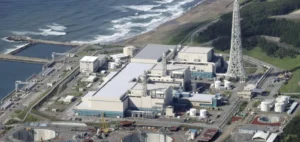The Minister of Energy Transition Agnès Pannier-Runacher defended Tuesday the implementation of a “Marshall Plan of skills” that must create “10,000 new jobs per year”, during a visit to Méréville (Essonne) to meet the blacksmiths who help build nuclear reactors.
In a huge hangar of the Union des Forgerons – a century-old company that manufactures custom-made parts – blocks of metal, copper or steel are heated to 1,000 degrees. Giant tongs grab them and forge them under a press with the dexterity and precision of human fingers. The blacksmith makes his own tools and works in couple with the one called the “smith”. To be a blacksmith is a real team work and meticulousness”, underlines to the AFP Jérémy Sibillotte, who made his studies in the forging and in charge of business within the Union of Blacksmiths.
In this factory in Méréville, an hour’s drive from Paris, parts are custom-designed for companies working in the aerospace, defense, aeronautics and nuclear industries. An industrial sector that the government wants to revive: “We need to recruit and train massively”, that is to say “create 10,000 new jobs per year” to reach “100,000 new jobs in 2030”, said the Minister of Energy Transition Agnès Pannier-Runacher, visiting the site.
Blacksmiths, boilermakers, technicians… are essential jobs for the manufacture of nuclear reactors but “too often unknown”, added the Minister. “We know the difficulties of work but in terms of remuneration, wages are higher than in other sectors,” continued Agnès Pannier-Runacher who stressed the “nobility of the profession (of blacksmith).
According to the government, it is necessary “to make it known that nuclear power is a tool like any other to enable the decarbonization of energy”.
The goal he has set himself: to completely decarbonize energy by 2050 “through renewable and nuclear power”. To achieve this, a report by a commission of inquiry calls for a revival of the nuclear industry which must pass, according to the report, among other things, by the skill: “We have forgotten to be proud of the blacksmiths, welders, … It is up to us to highlight the strength of these trades to attract young men and women,” said the rapporteur of the majority Antoine Armand. He handed over this report, with its clear pro-nuclear bias, to the minister at the end of the visit to the plant.






















